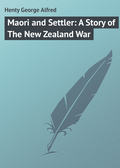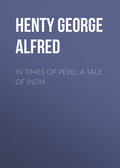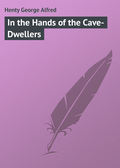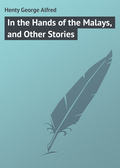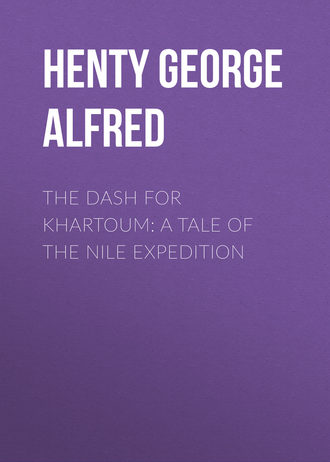
Henty George Alfred
The Dash for Khartoum: A Tale of the Nile Expedition
CHAPTER IX.
THE CAMEL CORPS
"Trumpeter Smith! Trumpeter Smith!" The shout ran through the arched corridor of the barracks, and a soldier putting his head through one of the windows repeated the cry at the top of his voice, for Trumpeter Smith was not in his barrack-room. Edgar, in fact, was walking on the shady side of the great court-yard chatting with two other troopers when his name was shouted.
"Hullo! What is it?"
"You are to go to Major Horsley's quarters."
Edgar buttoned up his jacket, ran to the washing-place, plunged his head and hands in water and hastily dried them, smoothed down his hair with his pocket-comb at a piece of looking-glass that had been stuck up against the wall above the basins, and adjusting his cap to the correct angle made his way to Major Horsley's quarters, wondering much what he could be wanted for, but supposing that he was to be sent on some message into the town.
The soldier-servant showed him into the room where Major Horsley and his wife were sitting.
After a word or two of kindly greeting from the lady, Major Horsley went on: "I told you a long time back, Smith, that I should not forget the service you did my wife and her sister, and that I would do you a good turn if I ever got the chance. Is there anything you particularly want at present?"
"No, sir, except that I have been thinking that I should be glad to give up my trumpet. I am just eighteen now, and it would be better for me, I think, to take my regular place in the ranks. I should be more likely to be promoted there than I am as a trumpeter."
"Yes, you would be sergeant in a very short time, Smith; after your behaviour at El-Teb you would be sure of your stripes as soon as you were eligible for them. But I should not advise you to give up your trumpet just at the present moment."
"Very well, sir," Edgar said, somewhat surprised.
"But there is something else you are wishing for, is there not? I fancy every officer and man in the regiment is wishing for it."
"To go up the Nile, sir?" Edgar said eagerly. "Yes; I do wish that, indeed. Is there any chance of the regiment going, sir?"
"No, I am sorry to say there is not," the major said.
"And a very good thing too, Richard," his wife put in.
"I do not think so at all. It is the hardest thing ever heard of that the regiments here that have had all the heat and hard work, and everything else of this beastly place, are to be left behind, while fellows from England go on. Well, Smith," he went on, turning to Edgar, "I am glad to say I have been able to do you a good turn. When I was in the orderly-room just now a letter came to the colonel from the general, saying that a trumpeter of the Heavy Camel Corps is down with sunstroke and will not be able to go, and requesting him to detail a trumpeter to take his place. I at once seized the opportunity and begged that you might be chosen, saying that I owed you a good turn for your plucky conduct at Aldershot. The adjutant, I am glad to say, backed me up, saying that you have done a lot of credit to the regiment with your cricket, and that the affair at El-Teb alone ought to single you out when there was a chance like this going. The colonel rather thought that you were too young, but we urged that as you had stood the climate at Suakim you could stand it anywhere on the face of the globe. So you are to go, and the whole regiment will envy you."
"I am obliged to you indeed, sir," Edgar said in delight. "I do not know how to thank you, sir."
"I do not want any thanks, Smith, for a service that has cost me nothing. Now you are to go straight to Sergeant Edmonds. I have sent him a note already, and he is to set the tailors at work at once to rig you out in the karkee uniform. We cannot get you the helmet they are fitted out with. But no doubt they have got a spare one or two; probably they will let you have the helmet of the man whose place you are to take. You will be in orders to-morrow morning, and I have asked Edmonds to get your things all finished by that time. Come in and say good-bye before you start in the morning."
There was no slight feeling of envy when Edgar's good fortune became known, and the other trumpeters were unanimous in declaring that it was a shame his being chosen.
"Well, you see, you could not all go," the trumpet-major said, "and if Smith had not been chosen it would have been long odds against each of you."
"But he is the last joined of the lot," one of the men urged.
"He can blow a trumpet as well as any of you," the sergeant said, "and that is what he is wanted for. I think that it is natural enough the colonel should give him the pull. The officers think a good deal of a fellow who helped the regiment to win a dozen matches at cricket, and who carried off the long-distance running prize at Aldershot; besides, he behaved uncommonly well in that fight, and has as good a right to the V.C. as any man there. I think that a fellow like that ought to have the pull if only one is to get it, and I am sure the whole regiment will be of opinion that he has deserved the chance he has got."
By the next morning the suit of karkee was ready, and Edgar was sent for early to the orderly-room and officially informed by the colonel that he had been detailed for service in the Heavy Camel Corps.
"I need not tell you, Smith, to behave yourself well—to be a credit to the regiment. I should not have chosen you for the service unless I felt perfectly confident that you would do that. I hope that you will come back again safe and sound with the regiment. Good-bye, lad!"
Edgar saluted and left the room. Several of the officers followed him out and bade him a cheery farewell, for he was a general favourite. All knew that he was a gentleman, and hoped that he would some day win a commission. He then accompanied Major Horsley to his quarters, and there the officer and his wife both shook hands with him warmly.
"You will be a sergeant three months after you come back," Major Horsley said; "and your having been on this Nile expedition, and your conduct at El-Teb, will help you on when the time comes, and I hope you will be one of us before many years are over."
Edgar then went up to his barrack-room to say good-bye to his friends, and took off his smart Hussar uniform and put on the karkee suit, amid much laughter and friendly chaff at the change in his appearance. The adjutant had ordered a trooper to accompany him to the camp of the Camel Corps, which was pitched close by the Pyramids, and to bring back his horse. He therefore mounted and rode out of the barracks, amid many a friendly farewell from his comrades. He rode with his companion into the town and down to the river, crossed in a ferry-boat, and then rode on to the camp. Inquiring for the adjutant's tent Edgar dismounted and walked up to that officer, and presented a note from the colonel.
The officer glanced at it. "Oh, you have come to accompany us!" he said. "You look very young for the work, lad; but I suppose your colonel would not have chosen you unless he thought you could stand it. I see you have got our uniform, but you want a helmet. We can manage that for you. Sergeant Jepherson, see if Trumpeter Johnson's helmet will fit this man; he is going with us in his place. Fit him out with water-bottle and accoutrements, and tell him off to a tent."
The helmet fitted fairly, and only needed a little padding to suit Edgar, who, after putting it on, ran out to where his comrade was waiting for him and fastened his own head-gear to the pummel of his saddle.
"Good-bye, young un!" the trooper said. "Hold your own with these heavies for the honour of the regiment. They mean well, you know, so don't be too hard upon them."
Edgar laughed as he shook the man by the hand, and as he rode off turned to look at the scene around him.
There were two camps at a short distance from each other, that of the Heavy Camel Corps to which he now belonged, composed of men of the 1st and 2d Life Guards, Blues, Bays, 4th and 5th Dragoon Guards, Royals, Scots Greys, 5th and 16th Lancers. The other was the Guards Corps, composed of men of the three regiments of foot guards. Edgar's first feeling as he looked at the men who were standing about or lying in the shade of the little triangular Indian mountain-service tents, was that he had suddenly grown smaller. He was fully up to the average height of the men of his own regiment, but he felt small indeed by the side of the big men of the heavy cavalry regiments.
"This way, lad," the sergeant into whose charge he had been given, said. "What is your name?"
"I am down as Ned Smith."
The sergeant smiled at the answer, for no inconsiderable number of men enlist under false names. He led the way through the little tents until he stopped before one where a tall soldier was lying at full length on the sand. "Willcox, this man has come to take the place of Trumpeter Johnson. He is detached for duty with us from the Hussars. He will, of course, share your tent."
"All right, sergeant! I will put him up to the ropes. What's your name, mate?"
"I go as Ned Smith," Edgar said.
"So you are going in for being a heavy at present."
"I don't care whether I am a heavy or a light, so that I can go up the river."
"Have you been out here long?"
"About a year; we were through the fighting at Suakim, you know. It was pretty hot down there, I can tell you."
"It is hot enough here for me—a good deal too hot, in fact; and as for the dust, it is awful!"
"Yes, it is pretty dusty out here," Edgar agreed; "and of course, with these little tents, the wind and dust sweep right through them. Over there in Cairo we have comfortable barracks, and as we keep close during the day we don't feel the heat. Besides, it is getting cooler now. In August it was really hot for a bit even there."
"Where are we going to get these camels, do you know?"
"Up the river at Assouan, I believe; but I don't know very much about it. It was only yesterday afternoon I got orders that I was to go with you, to take the place of one of your men who had fallen sick, so I have not paid much attention as to what was going on. It has been rather a sore subject with us, you see. It did seem very hard that the regiments here that have stood the heat and dust of this climate all along should be left behind now that there is something exciting to do, and that fresh troops from England should go up."
"Well, I should not like it myself, lad. Still I am precious glad I got the chance. I am one of the 5th Dragoon Guards, and you know we don't take a turn of foreign service—though why we shouldn't I am sure I don't know—and we are precious glad to get a change from Aldershot and Birmingham and Brighton, and all those home stations. You are a lot younger than any of us here. The orders were that no one under twenty-two was to come."
"So I heard; but of course as we are out here, and we have got accustomed to it, age makes no difference."
"What do they send us out here for?"
"There are no barracks empty in the town, no open spaces where you could be comfortably encamped nearer. Besides, this gives you the chance of seeing the Pyramids."
"It is a big lump of stone, isn't it?" Willcox said, staring at the Great Pyramid. "The chaps who built that must have been very hard up for a job. When I first saw it I was downright disappointed. Of course I had heard a lot about it, and when we got here it wasn't half as big as I expected. After we had pitched our tents and got straight, two or three of us thought we would climb up to the top, as we had half an hour to spare. Just as we set off one of the officers came along and said, 'Where are you going, lads?' and I said, 'The cooks won't have tea ready for half an hour, sir, so we thought we would just get up to the top and look round.' And he said, 'If you do you will be late for tea.'
"Well, it didn't seem to us as if it would take more than five minutes to get to the top and as much to get down again, so off we went. But directly we began to climb we found the job was not as easy as we had expected. It looked to us as if there was but a hundred steps to go up; but each step turned out to be about five feet high, and we hadn't got up above twenty of them when the trumpet sounded, and we pretty near broke our necks in coming down again. After that I got more respect for that lump of stone. Most of the officers went up next day, and a few of us did manage it, but I wasn't one of them. I did try again; but I concluded that if I wanted to go up the Nile, and to be of any good when I got there, I had best give it up, for there would not be anything left of me to speak of by the time I got to the top. Then those Arab fellows got round, and shrieked and jabbered and wanted to pull us up; and the way they go up and down those stones is wonderful. But of course they have no weight to carry. No, I never should try that job again, not if we were to be camped here for the next ten years."
"I have been up to the top," Edgar said; "but it is certainly a hard pull, and there is nothing much to see when you do get there—only so much more sand in all directions. The view from the great mosque at Cairo is much finer. Do you have much drill?"
"Morning and evening we work away pretty stiff. It is infantry drill we have. They say we are not going to fight on the camels, but only to be carried along by them and to get off and fight if we see the enemy, and as we are all new to each other there is a good bit of work to be done to get us down to work as one battalion. We and the 4th make a troop together. We have drill in the afternoon, too, for a bit. Of a morning those that like can go across and have a look at the town. I went yesterday. Rum old place, isn't it? The rummiest thing is the way those little donkeys get about with a fat chap perched on the top of a saddle two feet above them. Never saw such mokes in my life. They ain't bigger than good-sized dogs some of them, and yet they go along with fifteen or sixteen stone on their backs as if they did not feel it. Those and the camels pleased me most. Rum beasts those camels. I can't think what it must feel like to be stuck up on top of them, and if one does fall off it must be like coming off a church. Have you tried one?"
"No. I have never been on a camel. Of course we always have had our horses."
"Why didn't they get us horses?"
"I don't know. They could have bought a couple of thousand, no doubt, if they had tried; besides, they could have got some from the Egyptian cavalry. But if they had they would never have sent out you and the Guards; though the horses would have done very well to carry light cavalry. I fancy the idea is that in the first place we have to go long distances without water. Camels can stand thirst for three or four days together, and each camel can carry water for its rider. Then, too, we may perhaps march sometimes, and the camels could carry water and food. So, you see, they will be useful both ways."
"Well, I suppose it is all right," Willcox said; "and as you say, if they had gone in for horses they could not have carried us heavies. I am precious glad to come. So are we all; though why they wanted to bring us and the Guards—the biggest and heaviest men they could pick out in the army—on a job like this, is more than I can say."
"It is more than anyone can say, I should think," Edgar said; and indeed no reason has ever been assigned for the singular choice of the heaviest men that could be collected in the service for duty on a campaign such as this was to be, and for which light, active, wiry men were especially suitable.
"There is the dinner call."
"What troop are we in?" Edgar asked, seizing his trumpet, and on learning at once gave the troop call.
"We are in messes of eight," Willcox replied. "We and the three tents to the right have one mess. It is our turn to go over and get the grub."
Accordingly Willcox and Edgar went across to the field-kitchen and received the rations for their mess, consisting of beef and vegetables—the bread for the day had been served out early. Returning to the tents the rations were divided between the party of eight, and Edgar was introduced by Willcox to his new messmates.
"Your regiment was at Aldershot with us eighteen months ago."
"Yes; but I did not know any of your men. I was over one or two evenings at your canteen, which was by a long way the best in the camp."
"Yes, we used to have some good singing there and no mistake," one of the men said.
"The Long Valley is not bad in the way of dust, but this place beats it hollow," another put in.
"This is a cleaner dust," Edgar said. "The Long Valley dust blackened one; this does not seem to have any dirt in it. As far as the uniforms go there is not much difference, but one doesn't feel so grimy after a charge over this Egyptian sand as one did in the Long Valley."
"We played you fellows at cricket, I remember," the man said. "I was in our eleven. You beat us, for you had a youngster we could not stand up against, he was a beggar to bowl."
Edgar laughed. "I rather think I am the fellow," he said, "Trumpeter Smith."
"It was Trumpeter Smith, sure enough. Well, you can bowl and no mistake, young un. It is rum meeting out here like this. And how have you been getting on since? You fellows were in the thick of it at El-Teb, I saw; and got cut up a bit by those niggers, didn't you?"
"That we did," Edgar replied. "I am not sorry that we are going to fight as infantry this time, for I can tell you it is not pleasant charging among fellows who throw themselves down and hamstring your horse or drive a spear into him as he passes over them; and once down it is likely to go pretty hard with you."
"The infantry had it pretty hot too at Tamanieb?"
"Yes, they got into one of our squares, and I don't think many of our fellows would have ever got away if it had not been that Buller's square came up to their assistance. Still, I don't suppose that will ever happen again. If the infantry stand firm and shoot straight they ought never to be broken, while that cavalry business was a thing nothing could guard against. The best horseman in the world may go down if a fellow shams dead and then suddenly stabs your horse."
"There is no doubt the beggars can fight," Willcox said; "and I expect we shall get some tough work before we get to Khartoum. I only hope they won't catch us suddenly before we have time to get off those camels. Fancy being stuck up on one of those long-legged beasts with half a dozen niggers making a cock-shy of you with their spears."
"I don't think that will happen," Edgar replied. "We shall have the 19th to act as scouts, and as there will be no woods or thick scrub, from what I have heard of the country, as there was on the plains round Suakim, we ought not to be surprised."
"This meat is horribly tough," Willcox remarked. "It strikes me they ought to have examined every one's mouth before they sent them out, and to have chosen men with good sets of grinders, for I am sure they will want them for this stuff."
"The meat is tough out here. You see, it won't keep and has to be cooked pretty nearly warm, but it is better by a long way than that tinned meat which is all we shall get, I expect, when we once start."
"When are we going to start?"
"In a few days, I should think. The boats are being taken up fast, and I believe a lot of the Canadians went up yesterday. There are two or three infantry regiments up there ready to go on as soon as the boats for them get up; and as most of the camels are up there too, I should think they will push us up as soon as they can, as I suppose we are intended to go ahead of the boats and clear the banks."
Then they began to talk about the route, and Edgar, who had studied the maps and knew all that was known on the subject of the journey, drew on the sand the course of the Nile with its windings and turnings.
"You see the river makes a tremendous bend here," he said, "round by Berber. The general idea is that when we get to this spot, where there is a place called Ambukol, if there is news that Gordon is hard pressed and cannot hold out long, a column will march across this neck to Metemmeh, where there are some of Gordon's steamers. I expect that is the work that will fall to the Camel Corps, and that it is specially for this that we have been got up. You see, the rest of the journey is along the water side, and horses would have done just as well as camels, and would be much more useful, for, of course, the infantry will do the main fighting, and the cavalry are only wanted for scouting and pursuit. Camels are no good for either one work or the other, for nothing will persuade the beggars to move out of their regular pace, which is just about two and three-quarter miles an hour. If they did not intend to cut across this neck, I don't see what they wanted more than the boats with the infantry and a regiment or two of light cavalry on these country horses, which are wonderfully hardy and can stand work that would knock English horses to pieces in no time."
"Well, then, all that I can say is," Willcox put in, "that it is very lucky for us that the river makes that big twist, other wise we might be all kicking our heels at Aldershot or the Curragh, or in some garrison town. But I thought camels were fast beasts. I am sure I have seen pictures of Arabs riding about in the desert at a tremendous pace."
"There are some sort of camels called riding camels that are faster than the others, and there are dromedaries, which can trot as fast as a horse and keep it up for a long time; but the riding camels and dromedaries are both scarce and expensive, and you may be sure we shall not have many of them with us."
"They are beastly ill-tempered looking brutes," Willcox said. "When I was walking in the streets there the other day a string of them came along, and they grumbled and growled like wild beasts, and one showed his teeth and made as if he was going right at me. If I had not jumped into a shop I believe he would have had my ear off."
"They can bite, and bite very hard too; but it is very seldom they do, though they do make a wonderful pretence of being fierce. They call them the patient camel, but from what I have seen of them I should say that they are the most impatient, grumbling beasts in creation. It makes no difference what you do for them—whether you load them or unload them, or tell them to get up or lie down, or to go on or stop—they always seem equally disgusted, and grumble and growl as if what you wanted them to do was the hardest thing in the world. Still, they can do a tremendous lot of work, and keep on any number of hours, and I don't know what the people of this country would do without them."
In the afternoon Edgar paraded with his troop and fell into the usual routine of duty. As he had had a year's campaigning in Egypt he was regarded as an authority, and after three or four days was as much at home with the troop as he had been in his own regiment. He found these big men very pleasant and cheery companions. All had been picked for the service as being men of exemplary character; they were in high spirits at the prospect of the expedition before them, and were like a party of great school-boys out on a holiday. They took to Edgar kindly; belonging, as he did, to the light cavalry, they regarded him as a sort of guest among them, and from his being so much younger and smaller than themselves they looked upon him as a boy, and he quickly got the nickname of "The Kid."
Many questions were asked him as to the fighting powers of the wild natives.
"How they could break right into a square beats me altogether," one of the big troopers said. "They always tell us that cavalry have no chance nowadays of breaking into a square, for they would all be shot down by the breech-loaders before they could reach it, and yet these niggers, with nothing but spears, manage to do it. I cannot make head or tail of it; no more I can of you chaps getting cut up by them."
"You will understand it when you see it," Edgar said. "They run pretty nearly as fast as a horse can gallop, and they don't seem to fear death in the slightest, for they believe that if they are killed they go straight to heaven. It seems to me that savages must be braver than civilized soldiers. It was the same thing with the Zulus, you know, they came right down on our men at Isandula, and the fire of the breech-loaders did not stop them in the slightest."
"No more it would stop us, young un, if we got orders to charge. It did not at Balaclava."
"No, that is true enough," Edgar agreed; "but then we have got discipline. The order is given, and the whole regiment goes off together; one could not hold back if one would. But that is a different thing from rushing forward each man on his own account, as they did against us, and running up to what seemed certain death. I know the feeling among our fellows was that they would not have believed it had they not seen it."
"Well, I hope we shall get a chance of seeing it," the man said, "only I hope that we shall not be atop of them camels when they try it. I have been looking at the beasts over there in the city, and there does not seem to me to be any go about them. Beastly-tempered brutes! I don't believe you could get a charge out of them if you tried ever so much."
"No, I don't think you could," Edgar laughed. "But, you see, we are intended to fight on foot. We shall be like the old dragoons, who used their horses only to carry them to the place where they were to fight."
"No chance of any loot?" another put in.
"No chance in the world. At the best of times they wear a sort of dirty cotton sheet round their shoulders, but when they go into battle they leave that behind them, and fight only in their loin-cloths."
"I have heard," an old soldier said, "from some of our chaps who fought in the Indian mutiny, that they often found a lot of money and jewels and things in those loin-cloths of the sepoys."
"Ah, that was because they had been plundering treasuries and capturing booty of all sorts. But I do not suppose many of these Arabs ever saw a gold coin in their lives. They don't see many silver ones. What wealth they have is in sheep and cattle and horses, and with these they barter for such things as they require. No; if you are fighting out here for a year you will get nothing except a few worthless charms, of no value whatever except as curios."
"Well, I wish they would let us be off," another said. "I am sick already of these sands and that big lump of stone. I hear the boats are going up every day, and if they do not move us soon the infantry will be there before us."
"I think we shall travel a good deal faster than they do when we are once off," Edgar said. "They will have rapids and all sorts of difficulties to contend with, while we shall go on steadily, five-and-twenty miles a day perhaps. You may be sure we shall be well in front when the time for work comes. They would never go to the expense of sending you all out, and mounting you on camels, and then keep you behind."
"Have you heard the news, lads?" a sergeant asked, joining the group.
"No! What is it?"
"We are to strike tents at four o'clock this afternoon, march down to the river, embark in a steamer, and start to-night."
"Hooray!" the men shouted. "That is the best news we have had since we landed."
In a short time most of the men were at work giving a final polish to their arms. By four o'clock the tents were levelled and rolled up, the baggage was packed and sent forward on camels, and the regiment was formed up awaiting the orders to march. The heat of the day had somewhat abated, but the march, short as it was, was a trying one, from the clouds of light sand that rose from beneath the feet of the column, and the men were heartily glad when they embarked, two troops on board the steamer and the rest on large flats which she was to tow up the stream. Kits and belts were taken off, and the men made themselves as comfortable as the crowded state of the flats would permit. The officers were on board the steamer. As they started a loud cheer broke from the men. They were fairly off at last. There was no thought of the dangers and difficulties before them. It was enough for them that they were fairly on their way up the Nile to relieve, as they hoped, Khartoum, and to rescue Gordon.
"If this is campaigning I don't care how much we have of it," the soldier who was sitting next to Edgar said, looking up at the deep blue sky studded with stars. "This suits me down to the ground."
"You had better make the most of it," Edgar laughed, "it won't last long; and you will have nothing like it again. I own that, at any rate until we reach the highest point to which the boats can go, I think the infantry have got the best of it. Of course they will have hard work in hauling the boats past the rapids, and they will have some rowing to do when the wind is too light for the sails to carry them up, but I would rather sit in a boat and row than sit on the back of a camel."
"But the boats will go all the way, won't they?"
"It is not known yet. It is possible that when we get to a place named Korti, where the river makes a tremendous bend, some of us may cross the desert to Metemmeh, where Gordon's steamers will meet us. If we do I expect that will be the work of the three Camel Corps, and all the boats will go right round the river and join us there; that is, if they can get up the cataracts. I know the Egyptians say the water will be too low for the boats to go up. That may be true enough as to the native boats, but ours draw so little water that I believe there must always be depth enough for them, for there is always a good lot of water coming down here even at the driest season."
The regiment was disembarked at Assouan, and the next day four companies went up in two steamers to Wady Halfa, a hundred and eighty miles higher up the river. Edgar's troop formed part of the detachment. They had expected to see a place of some size, but found that it consisted only of a few mud huts and some sheds of the unfinished railway. Here for some days the men practised infantry drill and received their equipments and saddles, and then they were marched to the camel depot a mile away.



